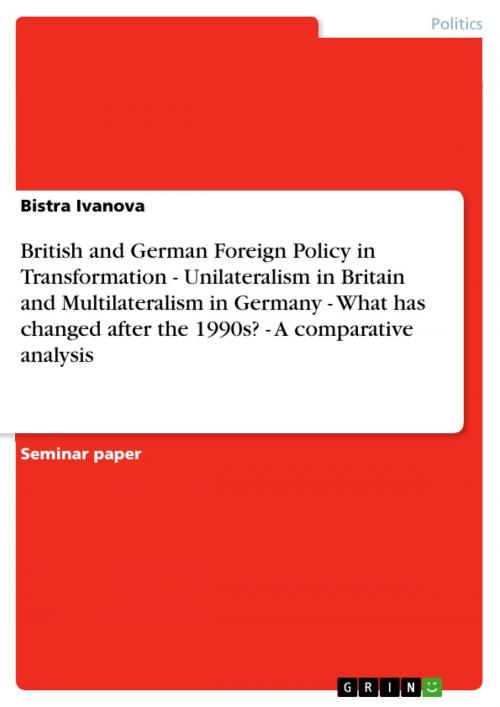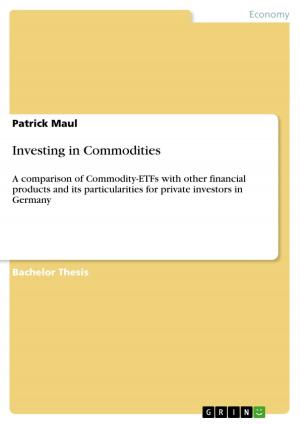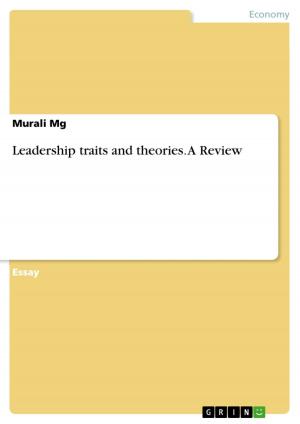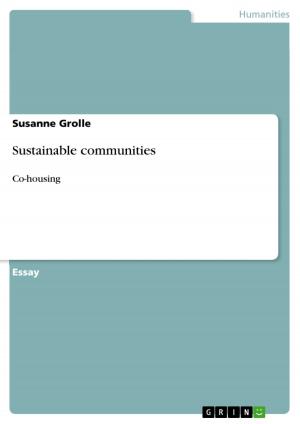British and German Foreign Policy in Transformation - Unilateralism in Britain and Multilateralism in Germany - What has changed after the 1990s? - A comparative analysis
Unilateralism in Britain and Multilateralism in Germany - What has changed after the 1990s? - A comparative analysis
Nonfiction, Social & Cultural Studies, Political Science, International, Foreign Legal Systems| Author: | Bistra Ivanova | ISBN: | 9783638593199 |
| Publisher: | GRIN Publishing | Publication: | January 16, 2007 |
| Imprint: | GRIN Publishing | Language: | English |
| Author: | Bistra Ivanova |
| ISBN: | 9783638593199 |
| Publisher: | GRIN Publishing |
| Publication: | January 16, 2007 |
| Imprint: | GRIN Publishing |
| Language: | English |
Seminar paper from the year 2006 in the subject Politics - Political Systems - General and Comparisons, grade: 2,0, Free University of Berlin, 16 entries in the bibliography, language: English, abstract: The process of development of the major European states' sovereignty after the sixteenth century is characterised mainly by different internal struggles for political authority. In comparing the international order of the Cold War period to the international system in the years after 1989, the analysts observe enormous, far-reaching changes which influenced to a great extend the foreign policies and in particular the strategies of the majors states in pursuing relations with the three significant international organizations - NATO, UN and EU. After the end of World War II Winston Churchill envisioned Great Britain as 'a global power with global interests' (White, 2002). During the Cold War Period its foreign policy was largely defined by the three 'concentric circles of the world politics (The British Empire/Commonwealth, the Atlantic community, and a United Europe)' (White, 2002). Identity and sovereignty were seen as essential foreign policy values. But nowadays Britain faces the need to adapt its policy to the fast changes in the modern international system. The developments in the global environment during the Post-Cold War Era have put many demands on British policy makers and have thereby defined Britain's place in the world of today. Contemporarily Britain can be clearly seen as a 'less sovereign' state, if it is described in terms of realism (Reynolds,1991). However, it is also a state that has always behaved in a sovereign manner and has actively exercised its sovereignty, rather than renouncing it. Britain today is in a situation in which its functions and the way in which it formulates its external relations are affected dramatically by the new international environment, thus challenging its status as a sovereign state. The unilateral strategy of Britain and its commitment to NATO have made it difficult for the country to be an active member in other forms of international organisations (where Transatlanticism does not play such an important role). Despite these challenges for the country's foreign policy strategies, however, we can also observe a change in the state's orientation towards Europe. British policy makers are reflecting about the future role of the United States in Europe, not only in terms of security matters but also economic and social development. [...]
Seminar paper from the year 2006 in the subject Politics - Political Systems - General and Comparisons, grade: 2,0, Free University of Berlin, 16 entries in the bibliography, language: English, abstract: The process of development of the major European states' sovereignty after the sixteenth century is characterised mainly by different internal struggles for political authority. In comparing the international order of the Cold War period to the international system in the years after 1989, the analysts observe enormous, far-reaching changes which influenced to a great extend the foreign policies and in particular the strategies of the majors states in pursuing relations with the three significant international organizations - NATO, UN and EU. After the end of World War II Winston Churchill envisioned Great Britain as 'a global power with global interests' (White, 2002). During the Cold War Period its foreign policy was largely defined by the three 'concentric circles of the world politics (The British Empire/Commonwealth, the Atlantic community, and a United Europe)' (White, 2002). Identity and sovereignty were seen as essential foreign policy values. But nowadays Britain faces the need to adapt its policy to the fast changes in the modern international system. The developments in the global environment during the Post-Cold War Era have put many demands on British policy makers and have thereby defined Britain's place in the world of today. Contemporarily Britain can be clearly seen as a 'less sovereign' state, if it is described in terms of realism (Reynolds,1991). However, it is also a state that has always behaved in a sovereign manner and has actively exercised its sovereignty, rather than renouncing it. Britain today is in a situation in which its functions and the way in which it formulates its external relations are affected dramatically by the new international environment, thus challenging its status as a sovereign state. The unilateral strategy of Britain and its commitment to NATO have made it difficult for the country to be an active member in other forms of international organisations (where Transatlanticism does not play such an important role). Despite these challenges for the country's foreign policy strategies, however, we can also observe a change in the state's orientation towards Europe. British policy makers are reflecting about the future role of the United States in Europe, not only in terms of security matters but also economic and social development. [...]















